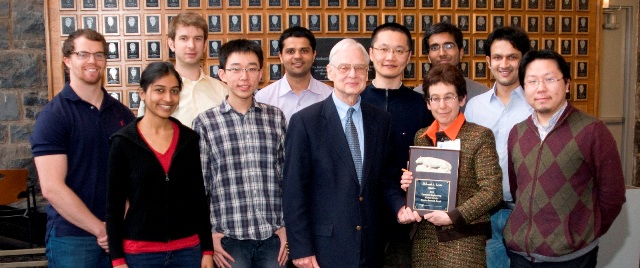SOCREF at Penn State: Dr. Deborah Levin: About
Deborah Levin grew up on Long Island, the daughter of a stockbroker and an elementary school teacher. In high school, she loved chemistry but remembers her best friend’s mother discouraging her pursuit of it.
“She told me the boys sit in class and don’t say anything, but they understand it,” Levin recalls. “The implication was that being a girl, I didn’t – or not at the same level.” Levin, who today is the only woman member of Penn State’s aerospace faculty, went on to defy everyone’s expectations but her own, earning first a bachelor’s degree in chemistry at SUNY Stonybrook and later her Ph.D. in chemistry at Caltech in 1979.
It was also at Caltech that she met her husband, Arne Fliflet, On graduation, they moved to the Washington, D.C., area where he went to work for the Naval Research Lab, and she took a job with the Institute for Defense Analyses (IDA). She was doing operational testing and evaluation for the military in the mid 1980s when the Reagan strategic defense initiative offered her the opportunity to study hypersonics, how gases interact with bodies moving through them at speeds much faster than sound. Levin wanted to re-connect with the computational research she had done as a graduate student so -- along with a lot of aerospace engineers -- she took the government up on its offer and enrolled in a class in hypersonic theory at the University of Maryland. The concepts made sense to her, she says, because her academic background made her so familiar with the chemical physics effects that were essential to them. The aerospace engineers, in contrast, were more comfortable with classical physics-based fluid dynamics.
Professor Levin transitioned to academia in 1998 (George Washington University), and then to Penn State in 2000. Her research interests include a broad range of both traditional Aerospace Engineering topics as well as those in the areas of biological system interactions with flows (Defense Threat Reduction Agency), plasma reactor materials processing (the Semiconductor Research Corporation), and green electrospray propellants (AFOSR). Her research interests in core Aerospace Engineering projects span the areas of micro-propulsion, thermal protection materials, and spacecraft contamination, as well as, theoretical particle approaches to modeling extreme thermochemical nonequilibrium. She has published over 300 publications (142 refereed and 170 conference papers) that have been cited approximately 500 times, and she has been an invited speaker at key international conferences and symposia.
Levin and her husband have four children. Along with their cocker spaniel, Bob, they divide their time between houses in State College and Alexandria, Virginia. Her husband and she are avid sailors on the Chesapeake Bay, Maryland.
